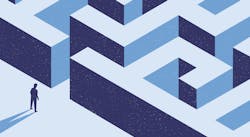This article first appeared in the July/August issue of Pro Builder.
Do you know what cognitive bias is? Me, neither … until about a year ago when, approaching 60, I became curious about my increasingly unreliable memory, which led me to study brain function, which led me down the rabbit hole of cognitive bias.
Simply, cognitive biases are involuntary errors in judgment that help us make decisions. They are necessary to winnow down the maelstrom of information we receive; to invent scenarios that help us cope and find meaning; and to select and form memories that last longer than others. They influence or drive every decision we make, from what to have for lunch to where to build the next project to how we vote in elections. They also limit our intelligence.
Researchers claim to have found about 180 cognitive biases, such as “action” biases (the preference to do something instead of nothing) and the “gambler’s fallacy,” the mistaken belief in an outcome based on past outcomes when really the outcome is random and unknowable (think: a Chiefs’ Super Bowl threepeat).
Then there’s the “sunk cost fallacy,” in which we keep doing what we already know because (we believe) it’s quicker and more efficient than learning something new. In fact, just the opposite is true: doubt, change, or despair about what we already know or believe to be true actually slows us down and reduces the frequency and number of accomplishments; satisfaction is more elusive; and we perceive we have less time in a day, a year, a life.
But while cognitive bias is hard-wired in the human experience, it is not entirely unchangeable if you are willing to approach life (and decisions) with curiosity instead of conviction, to seek out new information, the other side of an argument or position, and alternatives to your status quo. Exploring and learning new things also is one of the best ways to keep your brain healthy and strengthen (or at least not lessen) your memory.
By recognizing and fighting against the cognitive biases that reinforce what you and those around you already believe, the more likely you’ll venture out of your comfort zone and actually make better (and likely faster) decisions.
Apply that approach to your home building business and the benefits of practicing curiosity over confirmation are obvious, given current economic uncertainty and both chronic and (hopefully!) acute headwinds that increasingly challenge the status quo.
In survey after survey, both by us and others, builders consistently and perennially report a strong desire to streamline their operations and apply an “agile” mindset that enables them to more easily, quickly, and confidently break through barriers and gain competitive advantages—in essence, unlearn what they have learned and fight against their cognitive biases toward a more secure and sustainable future. I encourage you and your team to give it a try.
Stay Connected to Pro Builder
- Nominate an up-and-coming leader or housing industry legend for our Young Guns and Legends (formerly Forty Under 40) recognition program at probuilder.com/forty-under-40.
- Register now for the Women in Residential Construction Conference, Sept. 24-26 in Austin, Texas (women only, please!)
About the Author

Rich Binsacca
Rich Binsacca is editorial director of Pro Builder Media and Custom Builder Online. He has reported and written about all aspects of the housing industry since 1987 and most recently was editor-in-chief of Pro Builder Media. [email protected]
